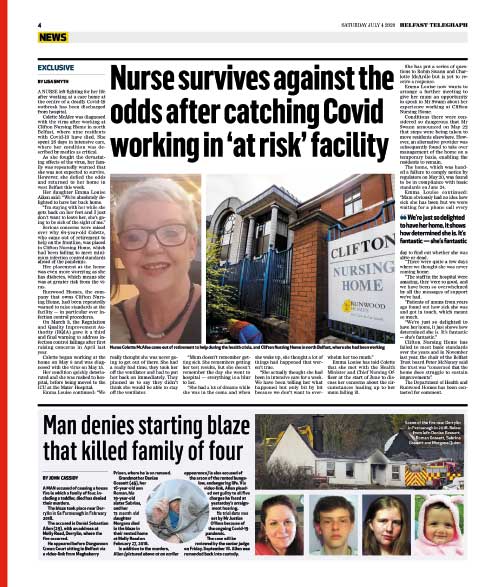Eoin Brannigan
Editor-in-chief Belfast Telegraph

Belfast Telegraph is published six days a week and distributed in Northern Ireland. Its sister newspaper, Sunday Life, is published weekly. It includes regional, national and international stories, news, current affairs, sport and entertainment.
www.belfasttelegraph.co.uk
Founded
1870
Daily readership print
151.400
Daily readership online
211.000
Number of subscribers
(print + digital) 7.134
Podcast
Ulster Rugby
Journalists employed
66
When the pandemic ends, a lot of questions will be asked about the mismanagement of care homes. The Belfast Telegraph gives a voice to victims and survivors..

2020 was to be a year of celebration at the Belfast Telegraph as we celebrated our 150th birthday on 1 September – instead, like all other publishers, we’ll remember 2020 as the year we left the office and published from everywhere we could find a wifi signal.
Despite the daily difficulties and unprecedented hurdles, we produced some great journalism from our bedrooms, kitchen tables and anywhere we needed to. Apart from the virus, there were some big stories in Northern Ireland in 2020, stories that generated huge interest and engagement with our readers. We led the way in coverage of the Bobby Storey funeral, and we had a real scoop over a Sinn Féin grants scandal – but even these stories would not have happened had it not been for the arrival of coronavirus early last year.
And it’s back to the first wave of the virus we need to go to find our most effective journalism of 2020.
When the pandemic ends, there will be a reckoning in most countries. Questions will be asked about how certain decisions were taken, why PPE took so long to arrive, why restrictions were lifted at certain times, why foreign travel was allowed to continue. In Northern Ireland, the management of care homes will be top of that list.
Our health correspondent, Lisa Smyth, uncovered various issues facing these particularly vulnerable members of society, all 16,000 of them. As the pandemic took hold, we ran a series of stories on the rising death toll at these homes. There was huge shock at our reports, and anger and sadness that the weakest in the community had been left so exposed to the threat of the virus.
One of the fundamental questions still to be answered is why care homes were forced to admit residents who had already picked up Covid-19 in hospital, leading to outbreaks in those homes. We also consistently published stories pressing for more and more testing to be put in place in care homes and highlighting the fact that a knock-on effect of the outbreaks was the pressure put on staff, which left many of them self-isolating.
One of these staff members was Colette McAfee, who selflessly came out of retirement to help her overworked former colleagues in the NHS. The 64-year-old was placed in a Runwood Homes centre, even though she was at serious risk of harm from the virus. There was an investigation as a result of our reporting her story and a subsequent apology to her. An official inquiry found a risk assessment had not been carried out prior to the Belfast Trust placing her at the home, despite the fact she had diabetes and “had come out of retirement to assist with the Covid-19 response”. Ms McAfee spent 26 days in intensive care, during which time her family was told she was not expected to survive.
Thankfully, she did, and like many other survivors and victims’ families, she’ll have plenty to tell any future inquiry. The Belfast Telegraph will make sure their voices are heard.